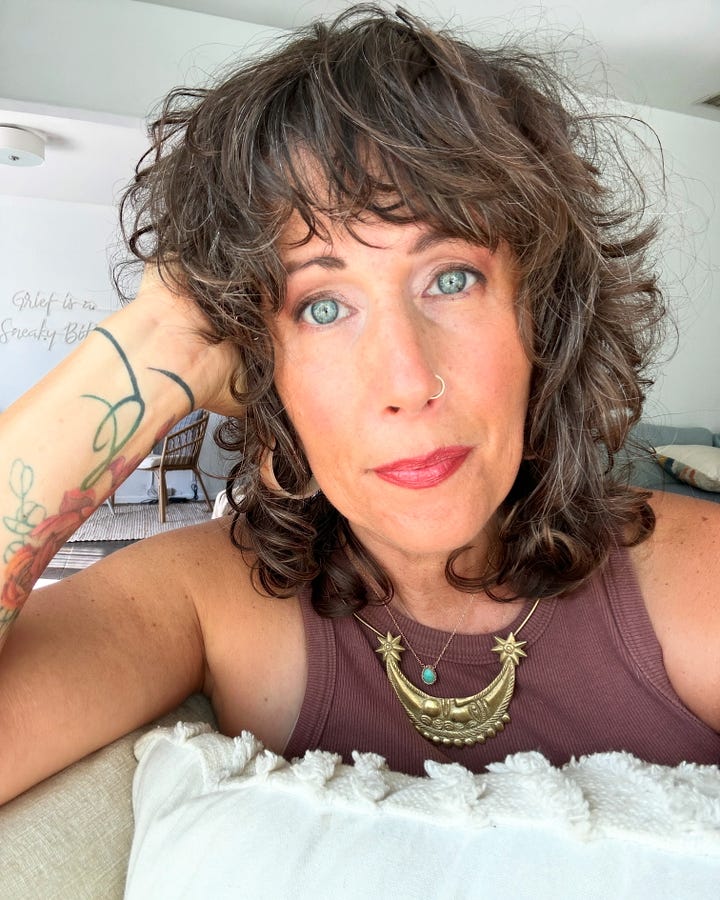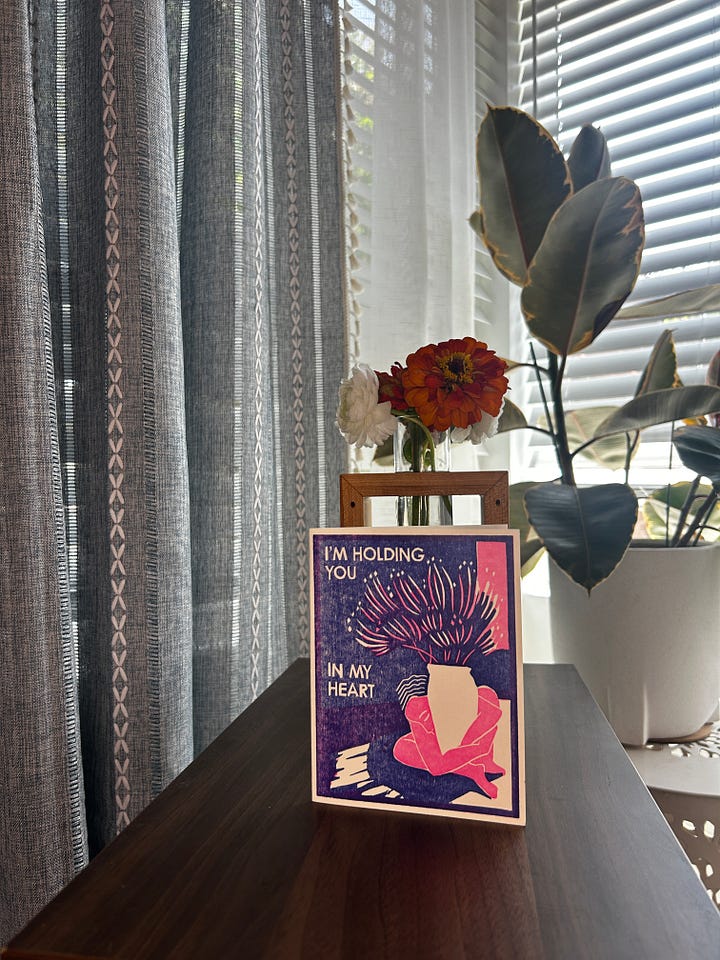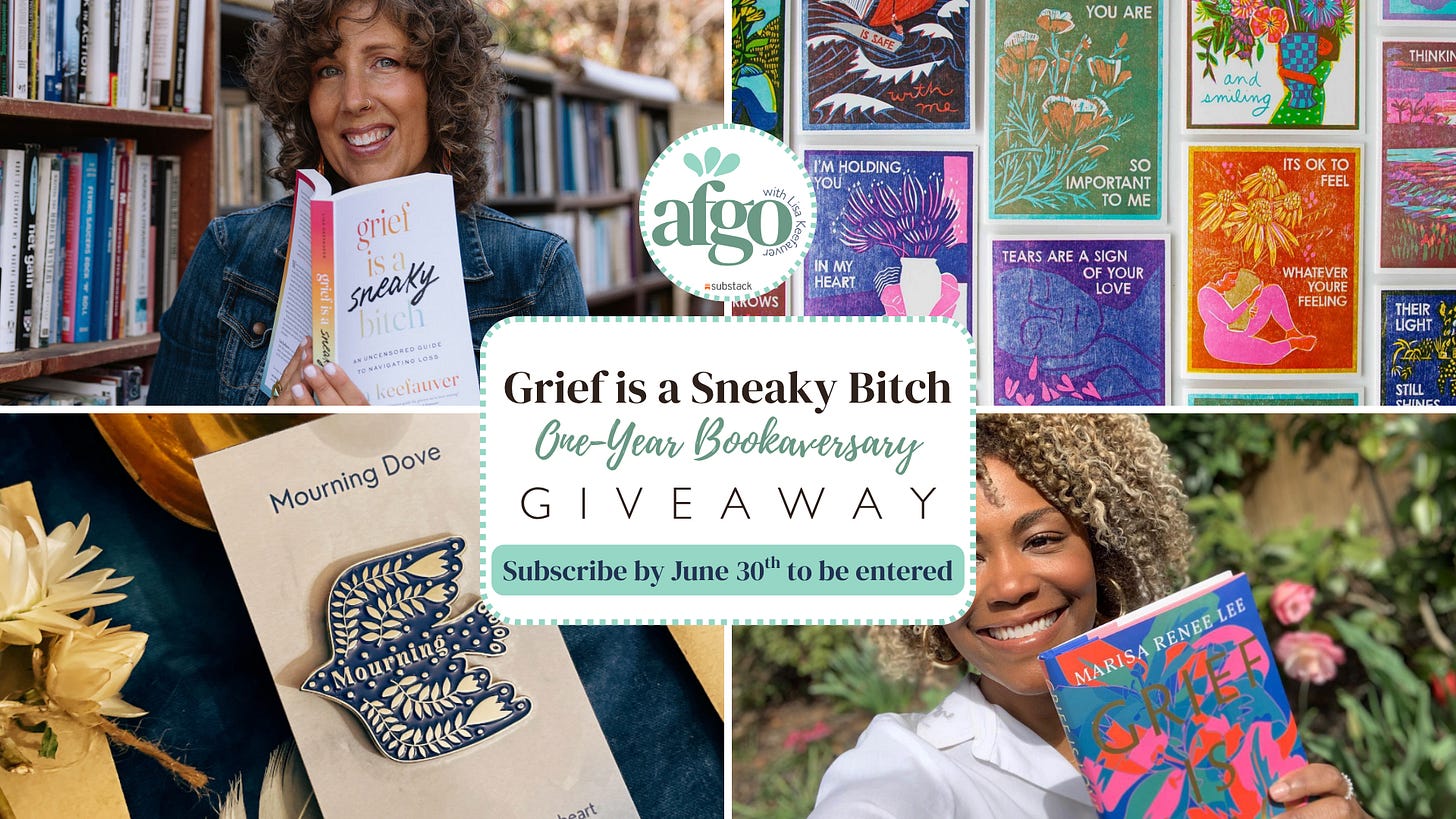Five Words That Are Making You Feel Stuck in Your Grief
Swear words are absolutely beneficial in your grieving process. These five words are not.
I’m starting this essay off with a big fat disclaimer.
Stuck is an overused concept in grief. Honestly it’s a tool of the productivity-obsessed grief illiterate culture we live in. It falsely assumes there is a consistent and “normal” pace at which we are meant to “progress” in our grief. Stuck implies that any period without significant change, any season of sameness, is a problem to be solved. That’s utter bullshit. See? That made me feel better.
AND, I know that the feeling of stuckness in grief is real. How? Because I’ve been there, felt that. In fact, I’m in a bit of a stuck place as I write this. So, what I’m sharing today is also what I’m actively practicing in my life on a daily basis.
Maybe we can do this together?
We’ve read the books, listened to the podcasts, talked with our therapists, friends, and family members. We’ve moved our bodies, attempted to eat nutritiously and sleep enough(ish). We understand that grief is non-linear, messy, and that it impacts our physical, cognitive, emotional, relational, and spiritual well being.
We still find ourselves feeling stuck, with the same thoughts looping around in our head, and in the stories we tell others about our grief. What I’ve learned over my nearly 14 years as a widow, 11 years as a grieving friend, and in my 20+ year career as a narrative-therapy trained social worker, is that words make worlds.
Words Make Worlds
As I shared in my conversation with Grief Researcher Mary-Frances O’Connor earlier this season on the podcast, words are powerful in our grief. They can either close us in or open us up. They can make us feel isolated and problematic or part of the human community. Words can add to our sense of stuckness, resistance, and avoidance.
Or they can offer us, though not easy, a path forward, a sense of expansion and belonging. That’s why it’s so important to tend to our words when we’re invited to tend to our grief.
These are the 5 most commonly used words that contribute to our sense of stuckness, causing us to suffer unnecessarily in our grief. You will often find them used by the critical inner-narrator in your head. They might show up in how we talk to others about our grief. You will notice too, that it’s often how others are talking to you about your grief.
But
When we use the word but in our grief, we’re amplifying the harmful myth that only one thing can be true at a time - we’re either grateful or sad, grieving or joyful. This word negates all the thoughts, feelings and sentiments that come before it. It can sound like, “I’ve felt much more at ease these past few weeks, but yesterday I was a crying mess.” Okay that’s technically true. Yet what would happen if you replaced but with and? How would that change what you see as possible (or not) going forward?
Always
I often catch clients using this one, “I’m always letting my family down because I’m just so sad all the time.” Why is that harmful? Well, like the word but, it negates facts - like their family may never or certainly don’t always feel let down. It also hides the truth that there are times when sadness isn’t at the forefront. Always, like it’s counterpart never isn’t just false, it’s limiting, cruel, and contributes to the notion that we lack agency in our lives.
Never
Never is the shifty twin of always. They often hang around together. This word also contributes to our sense of stuckness by denying the moments of change, or ease, or lightness we sometimes experience, no matter how small they are. Never is also a dark cloud preventing us from noticing the subtle shifts and transformations happening as we metabolize our grief. You might have said something like, “I’ll never feel better.”
Should
Should is a dirty word (and not the fun swearing kind). That’s one of the chapter titles in my book. Why? Because should and it’s ne'er-do-well cousin shouldn’t are toxic. When we use these words to talk about our grief, we’re incorrectly supporting the myth that there is a single right way to grieve. Each time we should all over ourselves, we’re reinforcing the belief that we have a moral obligation to think, feel, or behave a certain way for others. I have to admit, Should got me the other day. I heard myself saying to a friend, “I should feel more relieved than I do after learning my latest scan was clear.”
Shouldn’t
Using should and shouldn’t signals that we believe some thought, feeling, or action has a generally agreed upon value (good or bad). Every time we say these words, we’re also asking ourselves to change or adapt our feelings and behavior connected to this belief for the sake of others or as a sign that we are worthy of belonging. This is one we often tell ourselves in grief, and hear from others in expressions like, “You shouldn’t be sad. They would want you to be happy.” Gross.
Exercises to Ban the Use of BANSS
Did I just accidentally create an acronym? We need to ban BANSS in our grief? No? Not good? Okay, moving on.
One of the tools I teach the grieving clients I work with (and use myself, because I never offer what I don’t practice) is how to become a Should Detective. This applies to all the words on our banned list.
For one day or, if you’re feeling ambitious, for one week, I invite you to practice your should detective skills. Take some time, with intention, to notice every time you hear should or shouldn’t as it relates to your grief. The words might show up when talking to others about some aspect of your grief. The S words are often sneaky, appearing just as thoughts in your head. Also be on the lookout for when the BANSS words are spoken by others to you or about your grief.
For each instance of using one of the BANSS words you record in your journal, reflect on these 6 questions:
What About Grief Supporters
For the grief supporters reading this (which is essentially all of us), here’s a suggestion on words and phrases that might be making the relationship between you and the griever in your life feel sticky or stuck too.
“At least . . .”
“It’s just like when . . .”
“You shouldn’t think/feel/be . . .”
“You should think/feel/be . . .”
“But you used to . . .”
“But you always . . .”
“But you never . . .”
Instead, I’d like to suggest you consider some of the principles of Improv to help guide you.
Take a curious and non-judgmental approach. Remember, you don’t have to have the answers and you don’t need to fix them (because they’re not broken).
Respond with “Yes, and”: This helps you affirm their truth, which is one of the most important roles we play as grief supporters. It also acknowledges that things can be complex and more than one thing can be true.
Listen to and accept the gifts given to you. This lesson applies to both the griever and the grief supporter. For the griever, set down the individualism myth and accept help. For the grief supporter, if you listen well, the griever is telling you and showing you what feels helpful. Pay attention to the gifts you are given.
For more tips on how improv skills help you become a better grief supporter and more details on how to become a Should Detective, pick up a copy of Grief is a Sneaky Bitch: An Uncensored Guide to Navigating Loss.
Oh, and a Life Update
In the spirit of both/and, I thought I’d close with some fun and not-so fun things I’ve been up to since I last wrote to you. Because, my life is great and hard. Both are true.




I performed in my second ever Improv show and I had a blast.
I was invited to join the board of an Improv non-profit.
After a concerning season of feeling dissociated and numb, I started taking an anti-depressant for the first time in my life.
I proudly watched my daughter graduate, Magna Cum Laude, from UCSD last weekend. Incredible! It was also heartbreaking because Eric wasn’t there. And it was Father’s Day.
Back to proud, I cried with joy when I got the proofs for the Reimagining Grief Card Collaboration I’m doing with artist Rachel Kroh of Heartell Press.
My recent bloodwork shows the side-effects of my cancer treatment and on-going recurrence prevention medication have expanded. Despite eating incredibly healthy and moving my body 5 days a week, I have also developed osteopenia, pre-diabetes, and high cholesterol. Surviving cancer doesn’t come free.
If your life is a mix of both/and - which I’m guessing it is - please know that I see you. It’s normal. It isn’t a sign that you’re broken. It’s a sign that you’re human.
Until next time my sweet human friend, I see you, I hear you, and I’m holding you in my heart.











Hi Lisa,
I am so proud of you doing your improv/standup! Glad you are having some fun with that- bravery to the nth degree!
I cannot even believe it was a whole year since I met and saw you here in NY on your tour last summer
I hope this summer is not as crazy and you have easier adventures planned.
(I applaud the anti-depressant choice- I think I may be a candidate as well- have been thinking this now for a few months… crazy thing is I don’t “feel” depressed, but just super miss my husband/best friend) I’ll keep you posted!
Thanks for listening
Have a great weekend! xoBrett